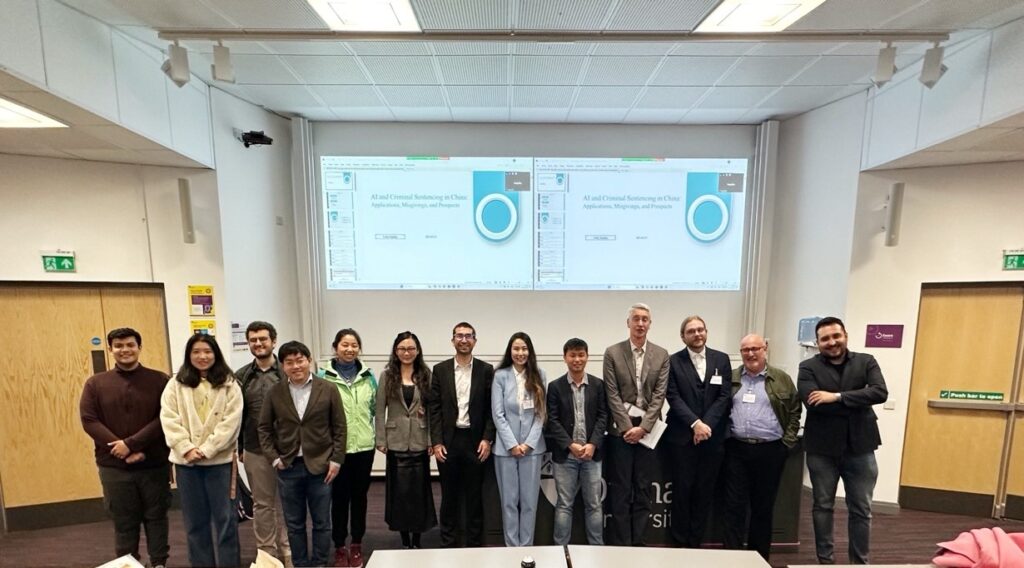Academic and Judicial Experts Gather at Durham University to Discuss AI, Justice, and Human Rights

On 15 May 2025, we hosted a workshop titled “Human Rights, Algorithmic Justice, and Global AI Policy,” bringing together a distinguished group of judicial experts and scholars to examine the impact of emerging technologies on civil society, human rights, access to justice, and public services.
The event was jointly sponsored by the Global Policy Institute (Durham University) and the Law and Technology Centre (University of Hong Kong), and took place at the Chemistry Building, Durham, UK.
The day began with welcome remarks from Prof. Volker Roeben, Dean of Durham Law School, and Dr Kavi Abraham, Deputy Director of the Global Policy Institute.
Prof. Andrew Murray (London School of Economics and Political Science) opened the presentations by exploring whether individuals have a human right to a human lawyer and judge—particularly in light of emerging AI-powered legal systems. Prof. William Lucy (Durham University) followed with a critique of the assumption that algorithms can enhance adjudication by eliminating human fallibility.
After a coffee break, Ms Xiaohan Liang (University of Hong Kong) analyzed the use of AI in criminal sentencing in China, highlighting its current function as a decision-support tool. Dr Zhiyu Li (Durham University) presented empirical research on public trust in algorithmic legal advice, raising questions about AI’s potential to democratize access to justice.
The afternoon sessions began with Prof. Benjamin Chen (University of Hong Kong), who discussed how predictive analytics influence legal negotiation and dispute resolution. Dr Marianne von Blomberg (Cologne University) examined algorithmic governance in China’s Zhejiang Province. Prof. Aziz Huq (University of Chicago) then proposed a model that embeds democratic values into the design of digital platforms.
The workshop culminated in a keynote address by The Right Honourable Sir Geoffrey Vos, Master of the Rolls and Head of Civil Justice in England and Wales. In his insightful and forward-looking speech, moderated by Dr Terry McGuinness, Legal Adviser to the Lady Chief Justice, Sir Geoffrey emphasized the need to consider whether—and how—the European Convention on Human Rights might be amended to protect individuals in the age of advanced AI. He stressed the importance of anticipating what humans truly value and what society will come to accept, noting that technological acceptance often evolves over time. The full transcript of Sir Geoffrey’s keynote speech is available at: https://www.judiciary.uk/keynote-speech-by-the-master-of-the-rolls-at-the-human-rights-algorithmic-justice-and-global-ai-policy-conference/.
The event concludes by closing remarks from the workshop organisers, Dr Zhiyu Li (Durham University) and Dr Benjamin Chen (University of Hong Kong). This event marks a significant collaboration between Durham University and the University of Hong Kong to build a global hub that fosters interdisciplinary dialogue at the intersection of AI, justice, and human rights.
We extend our sincere gratitude to the Global Policy Institute, the Law School, the School of Government and International Affairs at Durham University, and the Law and Technology Centre at the University of Hong Kong for their valuable support in making this event possible. The workshop also benefits greatly from the contributions of Dr Kaspar Ludvigsen (Durham University), Dr Can Eken (Durham University), Dr Moritz Osnabruegge (Durham University), and Mr Mauricio Figueroa Torres (Newcastle University), who have served as panel chairs and moderators.

 Photo credit: Ms. Fengyi Jiang, PhD candidate, Durham Law School
Photo credit: Ms. Fengyi Jiang, PhD candidate, Durham Law School
